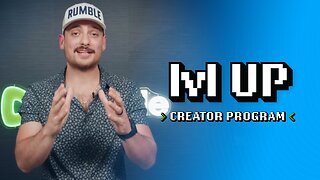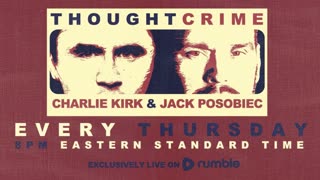Premium Only Content

fitness and alternative health
We often think of fitness as just hitting the gym, lifting weights, or going for a run. While these activities are certainly important, true fitness encompasses so much more. It's a holistic state of well-being that integrates physical, mental, and even emotional health. To truly unlock your potential and achieve lasting fitness, it's time to look beyond the traditional and embrace a more comprehensive approach.
Think of your body as an intricate machine. Each part needs to be functioning optimally for the entire system to thrive. Neglecting one area can have ripple effects throughout. This is where a holistic view of fitness comes into play.
Beyond the Physical:
While exercise forms the foundation, consider these crucial elements:
Nutrition: Fueling your body with nutrient-dense foods is paramount. It's not just about calories; it's about providing the building blocks for muscle repair, energy production, and overall health. Think whole foods, plenty of fruits and vegetables, lean proteins, and healthy fats.
Sleep: Quality sleep is when your body recovers and repairs. Aim for 7-9 hours of uninterrupted sleep each night to optimize hormone balance, cognitive function, and physical performance.
Stress Management: Chronic stress can sabotage your fitness goals. It leads to the release of cortisol, which can promote fat storage and muscle breakdown. Incorporate stress-reducing practices like mindfulness, meditation, yoga, or spending time in nature.
Mental Well-being: Your mental and emotional state significantly impacts your motivation, consistency, and overall enjoyment of your fitness journey. Prioritize self-care, address any underlying mental health concerns, and cultivate a positive mindset.
Integrating Alternative Practices:
Complementing your traditional fitness routine with alternative health practices can offer profound benefits:
Yoga and Pilates: These practices enhance flexibility, strength, balance, and body awareness. They also promote mindfulness and stress reduction.
Acupuncture and Massage: These therapies can help alleviate muscle tension, improve circulation, reduce pain, and promote relaxation, supporting recovery and overall well-being.
Mindfulness and Meditation: Cultivating present moment awareness can reduce stress, improve focus, and foster a deeper connection with your body.
Herbal Remedies and Nutritional Supplements: When used appropriately and under guidance, certain herbs and supplements can support energy levels, recovery, and overall health. However, it's crucial to consult with a healthcare professional before incorporating them.
Creating Your Holistic Fitness Plan:
The key is to find a balance that works for you. This might involve:
Variety in your workouts: Incorporate cardiovascular exercise, strength training, flexibility work, and activities you genuinely enjoy.
Mindful movement: Pay attention to your body during exercise, focusing on proper form and listening to your limits.
Nourishing your body with whole foods: Prioritize nutrient-rich meals and snacks.
Prioritizing sleep and stress management: Make these non-negotiable parts of your routine.
Exploring alternative practices: Find modalities that resonate with you and support your overall well-being.
Your fitness journey is a marathon, not a sprint. By adopting a holistic approach that nourishes your body, mind, and spirit, you'll not only achieve your physical goals but also cultivate a more vibrant and fulfilling life. Embrace the journey, listen to your body, and unlock your full potential!
Post 2: Beyond Pills and Procedures: Exploring the Realm of Alternative Health
In our modern world, conventional medicine plays a vital role in treating illnesses and managing acute conditions. However, for many, the journey to optimal health and well-being extends beyond the confines of traditional approaches. This is where the fascinating and often misunderstood realm of alternative health comes into play.
Alternative health encompasses a diverse range of practices and therapies that fall outside the scope of conventional Western medicine. These approaches often focus on treating the whole person – mind, body, and spirit – and emphasize prevention, self-healing, and natural remedies.
A Spectrum of Practices:
The world of alternative health is vast and includes modalities such as:
Traditional Medicine Systems: Ancient practices like Traditional Chinese Medicine (TCM) and Ayurveda, which have been used for centuries, focus on restoring balance and harmony within the body through herbal remedies, acupuncture, dietary adjustments, and lifestyle practices.
Mind-Body Therapies: These techniques recognize the powerful connection between the mind and body. Practices like yoga, meditation, tai chi, and hypnotherapy can help manage stress, reduce pain, improve mental clarity, and promote overall well-being.
Body-Based Therapies: These therapies focus on the physical structure and systems of the body. Examples include chiropractic care, osteopathy, and massage therapy, which aim to address musculoskeletal imbalances, improve circulation, and relieve pain.
Energy Therapies: These approaches work with the body's energy fields. Practices like Reiki and therapeutic touch aim to promote healing and relaxation by balancing these energies.
Nutritional Therapies: This involves using diet, supplements, and lifestyle modifications to address health concerns and promote optimal nutrition. This can include practices like herbal medicine and orthomolecular medicine.
Why Explore Alternative Health?
People turn to alternative health for various reasons:
Seeking Holistic Care: Many appreciate the focus on treating the whole person rather than just addressing symptoms.
Exploring Natural Remedies: Some prefer to utilize natural therapies and minimize the use of pharmaceutical drugs.
Addressing Chronic Conditions: Alternative approaches can sometimes offer relief and management strategies for chronic conditions where conventional medicine may have limitations.
Focusing on Prevention: Many alternative practices emphasize lifestyle changes and preventative measures to promote long-term health.
Personal Empowerment: Engaging in alternative health practices can empower individuals to take a more active role in their own well-being.
Important Considerations:
While alternative health offers promising avenues for healing and well-being, it's crucial to approach it with discernment and responsibility:
Do Your Research: Not all alternative therapies are created equal. Investigate the evidence base and the qualifications of practitioners.
Consult Your Doctor: Always discuss any alternative treatments you are considering with your conventional medical doctor, especially if you have existing health conditions or are taking medications. Integrative care, where conventional and alternative approaches work together, can be highly beneficial.
Be Wary of Unsubstantiated Claims: Be cautious of practitioners who make exaggerated or miraculous claims.
Listen to Your Body: Pay attention to how your body responds to any alternative therapies and discontinue if you experience any adverse effects.
The Future of Health:
The future of healthcare may lie in a more integrated approach that combines the strengths of conventional and alternative medicine. By embracing a broader perspective on health and well-being, we can empower ourselves to take charge of our health journey and explore a wider range of options for healing and thriving. The key is to be informed, responsible, and open to the possibilities that lie beyond traditional pills and procedures#FitnessJourney #HealthyLifestyle #AlternativeHealth #WellnessJourney
-
 1:32
1:32
Gaming on Rumble
10 hours agoWhat is the Rumble Creator Program?!?! | Lvl UP
21.9K4 -

Flyover Conservatives
22 hours ago9/11 on Steroids: What’s Coming This Fall? - Bo Polny | FOC Show
28.8K1 -
 1:01:28
1:01:28
Precision Rifle Network
8 hours agoS4E27 Guns & Grub - Let's Talk About Gas Guns
15K1 -
 59:29
59:29
The Charlie Kirk Show
4 hours agoTHOUGHTCRIME Ep. 96 — The Great Flag Burning Debate
42.1K33 -
 57:56
57:56
The Mel K Show
3 hours agoMel K & General Mike Flynn | Betrayal of a Nation: Soros’ NATO World Order | 8-28-25
26.3K24 -
 2:13:31
2:13:31
Joker Effect
2 hours agoInterviewing BEN JAMMINS! A personality with over 1 BILLION gif views. Let's give him a warm welcome
13.2K1 -
 11:37
11:37
Robbi On The Record
9 hours agoThe Devil is in the Branding..
14.5K9 -
 1:26:44
1:26:44
Savanah Hernandez
5 hours agoWhy Gen-Z Is So Radicalized Against Immigration
13.4K6 -
 2:36:19
2:36:19
megimu32
4 hours agoOTS: From A-List to MIA! 90s & 2000s Stars Who Vanished
8.85K3 -
 4:18:29
4:18:29
TinyPandaface
4 hours agoYour FACE Is A Gaming Channel! | Super Smash Bros w/ THE FELLAS!
5.96K